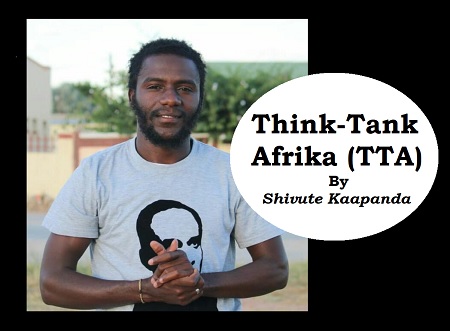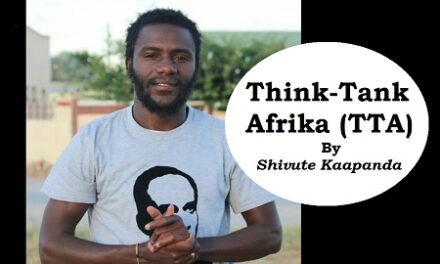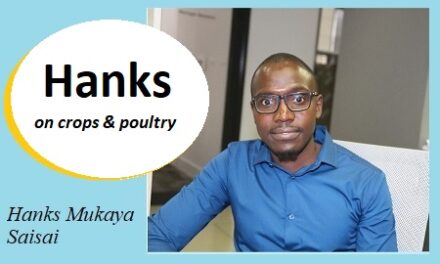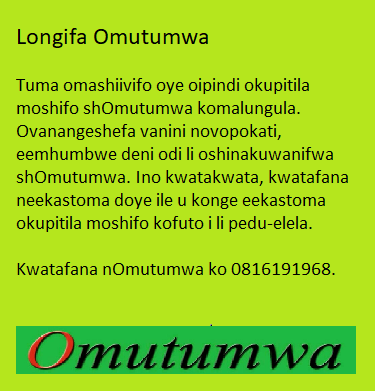The Etymology of Eyanda “lyaAina yaNguluwe” village
By Shivute Kaapanda [Think Tank Africa]
In conserving the history of our village we should indeed document every event of historical significance so that the future generations will know it.
History is a story of the past that illuminates the present and the future therefore in documenting the history of our villages, towns, settlements and country it’s our mandate as people of the earth.
An individual, a tribe, a country or even a continent which does not know its history does not know its roots and it becomes a laughing stock to the rest of the world.
It is on this account that as a writer I have made extensive research about the history of my village as an inspiration to many African kids and young people who are interested in writing their history.
Eyanda is a small village situated in the Olupaka district of Outapi Constituency in northern Namibia.
Situated 10 kilometers west of Omusati region’s administrative capital town of Outapi and bordering nearby villages such as Okahala, Ouhongo and Oshitukafitu, Eyanda is known to have housed a school (Olupaka combined school), a kindergarten (Olupaka kindergarten), a church (Olupaka Roman Catholic Church) and few cuca shops.
Historically the name of the village is called “Eyanda” with a motto or slogan added to it: “LyaAina yaNguluwe” loosely translated as “of Aina yaNguluwe”.
The etymology (origin and development) of the name “Eyanda” and its motto is quite interesting and it has vocally evolved so much that it has lost the original term and meaning to which it was named after.
As tate Simon would narrate in a telephonic conversation that in the far history of our grandmothers/fathers Ombalanhu area was less populous as only areas of Ombandjele west of Outapi were inhabited by people and the rest of the areas were inhabited by wild animals and there were only cattle posts including areas known as Eyanda village today. A man by the name of Akutona is known to be among the first inhabitants of Eyanda.
The name Eyanda is coined from the name “Oshaanda”- ‘a fontein’. According to tate Simon there was a thick and bushy forest of camelthorns (omano) in the central part of Eyanda. At the thick forest hunters and people at that time noticed that there was a waterpoint and a big camelthorn tree and a fountain where herds of warthogs inhabited; the present day area is known as Eviya lyaAnda.
The name Eyanda lyaAina yaNguluwe therefore followed these series of historical events: Eyanda (The fountain) lyoino/lyeno (of Camelthorn tree(s) lyEenguluwe (of warthogs).
In short the origin and development of the name “Eyanda” was mainly given to point out a fountain at a place where the camelthorn trees were, the Camelthorn trees which were known for being a home to the warthogs.
Very interesting and very rich in history as many today only know the name ‘Eyanda’ as something related or close to a ‘grain storage’, and the motto ‘LyaAina yaNguluwe’ as if it were a name of a person who could have been the first inhabitant or a headman in history.
Thus Eyanda village is a great village of our ancestors to which history should always be recorded.
The traditional leadership of Eyanda village is historically as other villages led by a matriarchal system of headmanship that we want to abolish as it’s characterized by discrimination against equal rights as enshrined in the constitution of the republic of Namibia as we move to transform the traditional authorities act and the constitution of Ombalanhu traditional authority as a first point of departure.
The meaning and development of the name Eyanda and its motto is amazing when history is well put together. It is more juicier when it’s said that “Eyanda olyaAina yaNguluwe, mwaza Kanghwili ta nyaya nOshipandi shEehonga”.
Kanghwili was known to be an inhabitant of Okahala village who used to come to Eyanda forest to cut logs of mopane sticks and one bad day met a big lion, and out of fear he eventually run back home with a load of logs on his shoulders. History will write Kanghwili on the bag of sugar and the lion of Eyanda as a writer.
– Shivute Kaapanda is an African Activist writer and a fearless author of the book titled “The Conscious Republic” published in 2020. He can be reached at iskaapanda@gmail.com





